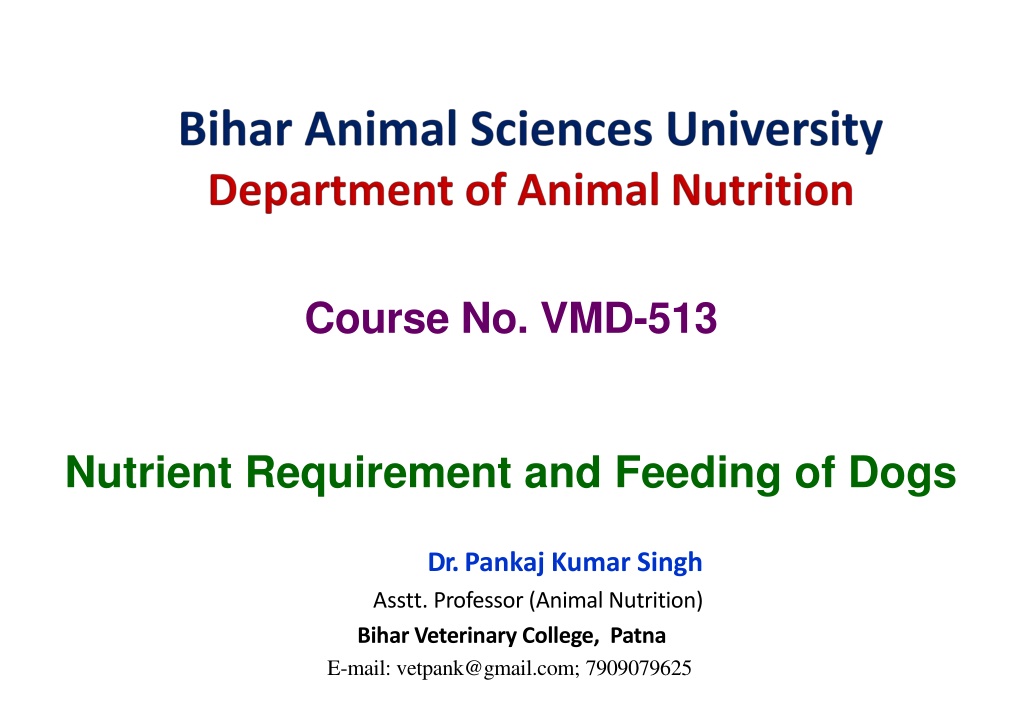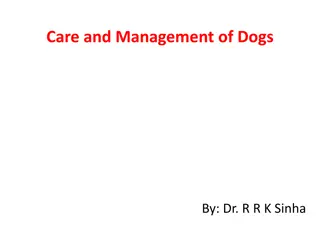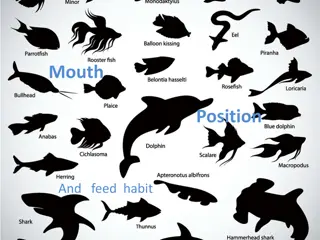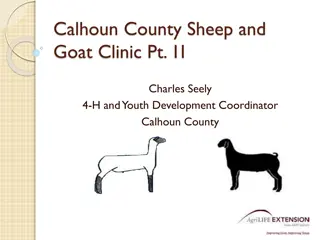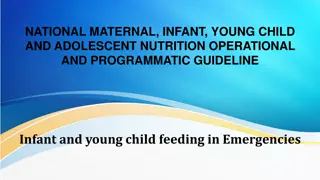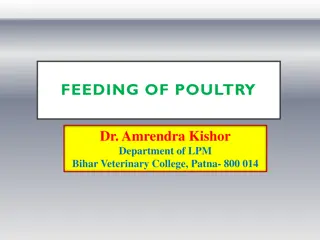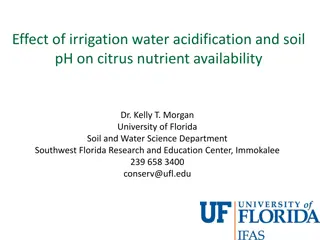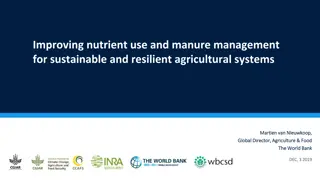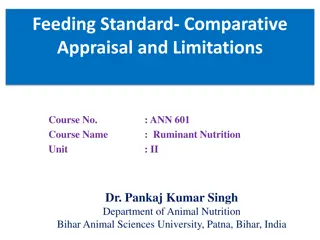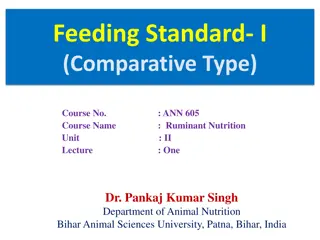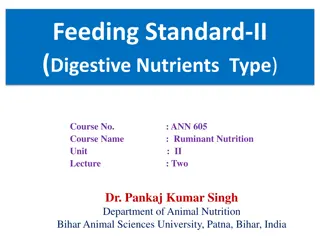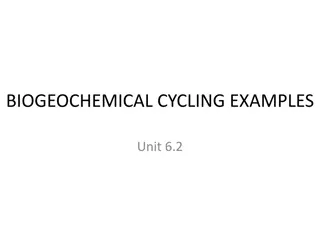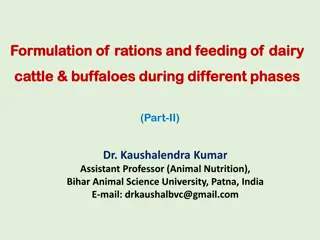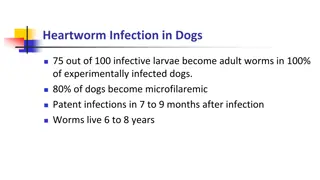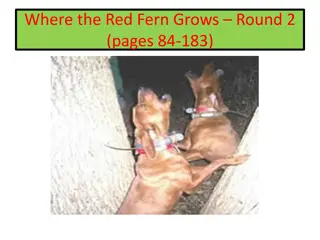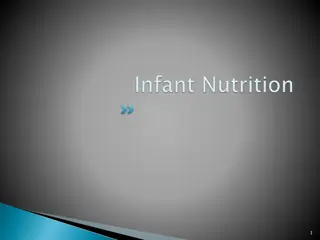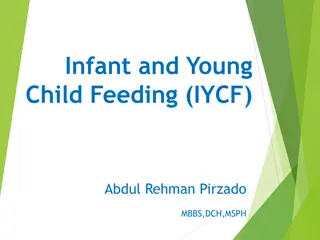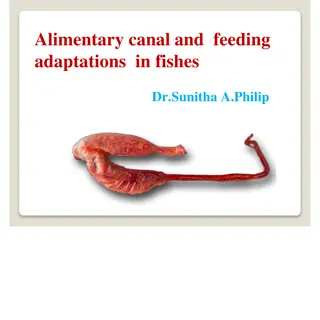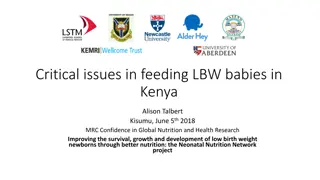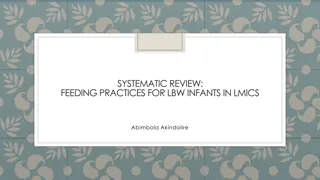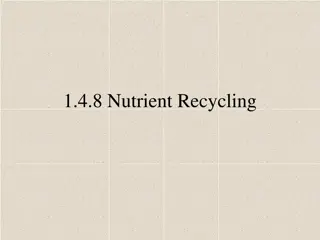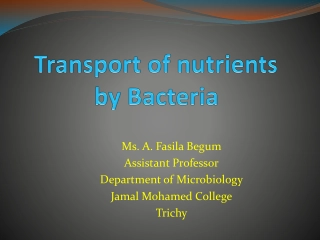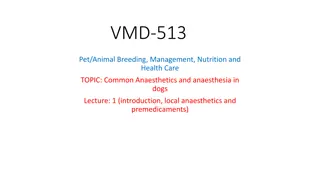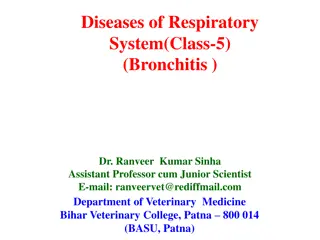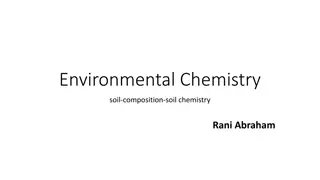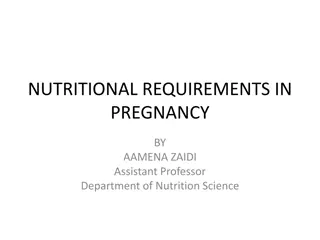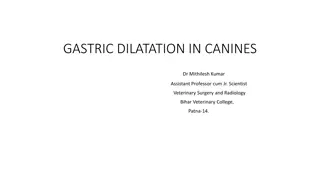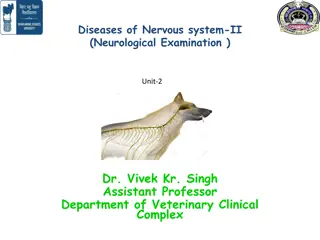Nutrient Requirements and Feeding of Dogs - Key Insights
This course delves into the essential nutrients required by dogs, including energy, protein, carbohydrate, fat, and water. Factors such as physiological state, breed differences, and environmental conditions influence dogs' energy requirements. Understanding these factors is crucial for maintaining optimal health and well-being in dogs.
Download Presentation

Please find below an Image/Link to download the presentation.
The content on the website is provided AS IS for your information and personal use only. It may not be sold, licensed, or shared on other websites without obtaining consent from the author. Download presentation by click this link. If you encounter any issues during the download, it is possible that the publisher has removed the file from their server.
E N D
Presentation Transcript
Course No. VMD-513 Nutrient Requirement and Feeding of Dogs Dr. Pankaj Kumar Singh Asstt. Professor (Animal Nutrition) Bihar Veterinary College, Patna E-mail: vetpank@gmail.com; 7909079625
The requirements of various nutrients discussed here are as follows; o Energy o Protein o Carbohydrate o Fat o Water 2
Factors influences the energy requirements: 1.Physiological State o Compared to adult dog, growing puppies require 2 to 4 times more energy per Kg BW. o As the puppy approaches adulthood, energy requirement is reduced. o For reproducing females, energy requirements at the end of gestation & during early lactation is 2 to 4 times greater than that of adult maintenance 4 requirement
2. Breed Differences o Small breed dogs grow to a mature weight, which is up to 30 times greater than their birth weight. o Therefore, small breeds require more food per Kg of BW as compared to large breeds. o To relate energy needs to body size, energy standards for dogs are usually established by body weight. Mature body weights Energy requirement (ME per Kg. of body weight per day). Less than 10Kg 50 Kcals Between 10 and 20 Kg 30-40 Kcals Greater than 20 Kg 20-30 Kcals 4
o Dogs housed outdoors & exposed to extreme weather have changes in their caloric requirements. o During & hot weather, may be required energy needs decreases less food o During maintain body temperature & more food may be required. cold weather, energy needs increases to 5
4. Activity o During hard work, individual dogs energy requirements will be increased above that of maintenance. o Hard-working dogs require more energy intake per Kg of BW during the periods when they are training or working. o When the animal is not training or working, their energy requirement is lower and a maintenance-type food may be fed. o Feeding of high-calorie, nutrient dense foods to dogs, when they are not training or working could contribute to over weight. 6 Kaushalendra Kumar, BVC, BASU,Patna 04-04-2020
o Animals eat to meet their energy needs and the intake of all nutrients is influenced by the amount of energy present in the diet. o The energy content of the diet generally limits the amount of food an animal will consume. 7
Dietary proteins, digested in stomach & small intestine are broken down to form free amino acids, then absorbed into the blood stream. Amino acids are distributed to all cells of the body, where they are utilized to build body tissue. Out of the 20 amino acids involved in the synthesis of proteins in the body only 10 of these are essential for dogs. Essential amino acids include: arginine, histidine, isoleucine, leucine, lysine, methionine, phenylalanine, threonine , tryptophan & valine. 11
Dog protein requirement depends on stage of life and activity of dogs. Puppies need more protein than adult dogs. Protein needs of a puppy can be met by a high quality protein providing 20 to 25% of dietary calories. Severe protein deficiency in dogs results in poor food intake, growth retardation or weight loss, muscle wasting, emaciation & death. Less severe deficiency, causes a rough & dull hair coat, compromised immune system & poor milk production in reproducing bitches. During periods of stress, the protein requirement may be increased. 12
Carbohydrates are sugars, starches and dietary fibres (not completely digestible). Supplied in the diet by cereal grains and sugars, such as glucose, sucrose and lactose. When carbohydrate energy is stored in the form of glycogen in the liver and consume more carbohydrates than are needed, excess muscles and is converted to fat and stored in adipose tissues. During fasting, stress, or exercise, glycogen is broken down to glucose & delivered to the bloodstream where it is distributed to all body tissues. 13
Dietary fibres has numerous effects within the gastrointestinal tract. Fibres have high water-holding capacity & contribute to easy passage of digesta. Due to bulkiness, cause stomach distention, which reduce feed intake. Decreases digestion and absorption of fat, vitamins and minerals. As a protective mechanism, fibre can bind to some toxins and prevent their absorption into the bloodstream. Excessive dietary fibre is associated with loose stools, flatulence, increased stool volume & frequency & decreased dietary caloric density. 14
Fat Fats are concentrated forms of energy. Fat digestion is more complex than that of protein or carbohydrates. Healthy dogs can digest fats with great efficiency, approximately 90-95%. Fat Requirement Fat supplies essential fatty acid linoleic acid. This is essential by dogs for maintaining healthy skin and haircoat & serves as a carrier for fat-soluble vitamins. Fat also contributes to the palatability. Animals fed diets too low in fat may develop dry, coarse hair, dry & thickended skin
Water requirement is determined by the amount of food that the animal consumes. In general, animals require 1 ml of water for each kcal of energy. If a dog requires 1000 kcals per day, therefore, it requires 1000 ml of water. As food intake increases, water intake also increases. When the water content of a diet increases, animal drinks less water. 16
NUTRIENT CONTENT FOR DOG FOODS (As per AAFCO- Association of American Feed Control Officials) Nutrients DM Basis GrowthReproduction Mantenance Units % % % % % % % % % % Protein Fat Linoleic Acid 18:2 Arginine Histidine Isoleucine Leucine Lysine Methionine + Cystine Phenylalanine + Tyrosine 22 8.0 1 0.62 0.22 0.45 0.72 0.77 0.53 0.89 18 5.0 1 0.51 0.18 0.37 0.59 0.63 0.43 0.73 Threonine Tryptophan Valline % % % 0.58 0.20 0.48 0.16 0.39 0.48 17
Growth Reproductio n Nutrients DM Basis Mantenance Units Minerals Calcium Phosphorus Ca:P Ratio Potassium Sodium Chloride Magnesium Iron Copper Manganese Zinc Iodine Selenium % % 1.0 0.8 1 to 1 0.6 0.3 0.45 0.04 80 7.3 5 120 1.5 0.11 0.6 0.5 1 to 1 0.6 0.06 0.09 0.04 80 7.3 5 120 1.5 0.11 % % % % mg/kg mg/kg mg/kg mg/kg mg/kg mg/kg 04-04-2020 18
Growth Reproduction Nutrients DM Basis Mantenance Units Vitamins VitaminA Vitamin D Vitamin E Vitamin B1(Thiamine) Vitamin B2(Riboflavin) PantothenicAcid Niacin mg Vitamin B6Pyridoxine) FolicAcid Vitamin B12 Choline IU/kg IU/kg IU/kg mg/kg 5000 500 50 1.0 5000 500 50 1 mg/kg 2.2 2.2 mg/kg mg/kg mg/kg 10 11.4 1.0 10 11.4 1.0 mg/kg mg/kg mg/kg 0.18 0.022 2.0 0.18 0.022 1200 9 1
Body weight Dry matter 2.5 5 kg 3 3.5 % 5 10 kg 2.5 3% 10 kg and above 2 2.5% 41
Puppy feeding schedule Puppies may get enough nutrients from milk during the first 3 or 4 wks of life. Cows milk is not a substitute as the composition varies. But orphan puppy or kitten, feeding puppy or kitten under insufficient mother s milk, cow milk can be used with appropriate modification to simulate mother s milk. Young puppies should be fed 4 or 6 times daily at equal time intervals.
Cow milk 800 ml Cream 200 ml Egg yolk 1 no. Steamed bone meal 6 gram VitaminA 2000 IU Vitamin D 500 IU Citric acid 4 gram
Questions, if any?? THANKS
